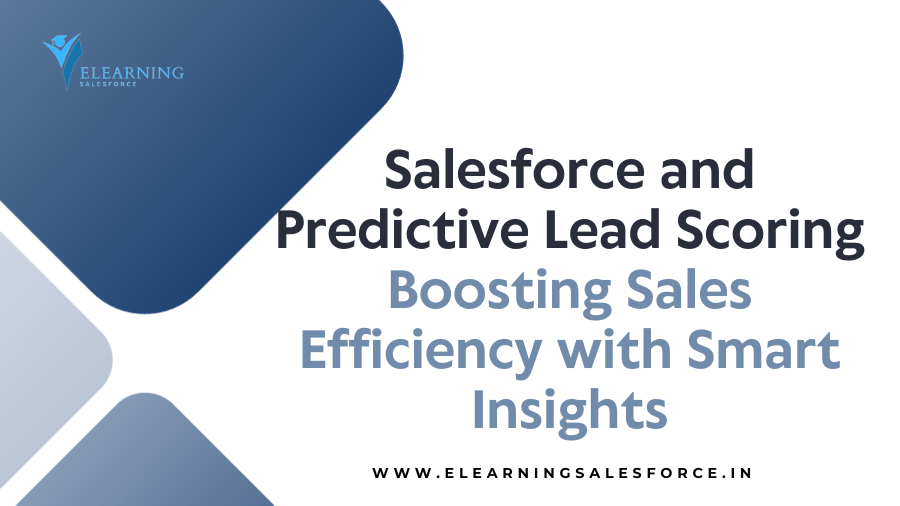In the dynamic realm of sales, every lead represents an opportunity. Enter Predictive Lead Scoring—a game-changer for sales teams looking to revolutionize their approach. In this article, we explore the seamless integration of Salesforce and Predictive Lead Scoring, unlocking a new era of lead prioritization and conversion optimization.
Understanding Predictive Lead Scoring
Predictive Lead Scoring is not just a buzzword; it’s a strategic approach to lead management that leverages advanced algorithms and artificial intelligence to predict the likelihood of a lead converting into a customer. Unlike traditional lead scoring, which relies on predefined rules, predictive lead scoring adapts and learns from data patterns, providing more accurate and dynamic insights.
Benefits for Sales Teams
Sales teams are the backbone of any business, and Predictive Lead Scoring empowers them to work smarter, not harder. By streamlining lead prioritization based on data-driven insights, sales professionals can focus their efforts on leads with the highest conversion potential. This not only increases efficiency but also contributes to a significant boost in conversion rates.
Integration Process with Salesforce
The beauty of Predictive Leads Scoring lies in its seamless integration with Salesforce. This powerful duo ensures that predictive insights become an integral part of your existing Salesforce workflows. The integration process is customizable, allowing businesses to tailor the solution to their unique needs and preferences.
Key Features of Salesforce and Predictive Lead Scoring
Salesforce, with its robust AI capabilities, takes Predictive Lead Scoring to the next level. By harnessing the power of Salesforce AI, businesses can gain deeper insights into leads, improving the accuracy of predictions. This synergy between technology and strategy enhances decision-making processes and contributes to more effective sales initiatives.
Case Studies: Success Stories
Real-world success stories underscore the transformative impact of Salesforce and Predictive Leads Scoring. Businesses across industries have witnessed tangible improvements in lead conversion rates, demonstrating the potential for substantial returns on investment.
Overcoming Challenges in Implementation
While the benefits are undeniable, the implementation of Predictive Lead Scoring in Salesforce may present challenges. Addressing concerns such as data security, system compatibility, and team adoption is crucial. This section explores common obstacles and provides best practices for a smooth integration journey.
Training and Adoption for Sales Teams
Introducing a powerful tool like Predictive Lead Scoring requires more than just technical integration—it demands buy-in from the sales team. Training programs and ongoing support ensure that sales professionals are not only comfortable using the new system but are also maximizing its potential in their day-to-day activities.
Continuous Monitoring and Optimization
Predictive Lead Scoring is not a one-and-done solution. Regularly monitoring the effectiveness of lead scoring models and making data-driven adjustments are essential for long-term success. This iterative process ensures that the system evolves with changing market dynamics and business objectives.
Future Trends in Predictive Lead Scoring
As technology continues to advance, so does the landscape of Predictive Lead Scoring. Explore emerging trends and technologies that promise to shape the future of lead management within the Salesforce ecosystem.
Success Metrics and KPIs
Measuring success is key to any strategy. This section delves into the metrics and key performance indicators that businesses can use to evaluate the impact of Salesforce and Predictive Lead Scoring on their sales performance.
User Testimonials
What better way to understand the impact of Salesforce and Predictive Lead Scoring than through the eyes of users? Gather insights and feedback from Salesforce users, providing a holistic view of user satisfaction and experiences.
FAQs: Addressing Common Queries
- Q: How does Predictive Lead Scoring differ from traditional lead scoring in Salesforce?
- A: While traditional lead scoring relies on predefined rules, Predictive Lead Scoring uses advanced algorithms and AI to adapt and learn from data patterns for more accurate predictions.
- Q: Can Salesforce AI be customized for specific industry needs in Predictive Lead Scoring?
- A: Yes, Salesforce AI capabilities are highly customizable, allowing businesses to tailor predictions to their unique industry requirements.
- Q: What challenges might businesses face during the implementation of Predictive Lead Scoring in Salesforce?
- A: Common challenges include data security concerns, system compatibility issues, and ensuring smooth team adoption.
- Q: How often should businesses update their lead scoring models for optimal performance?
- A: Regular updates are recommended, at least quarterly, to ensure that lead scoring models remain aligned with changing market dynamics.
- Q: Can Predictive Lead Scoring be integrated with other Salesforce features for a comprehensive sales strategy?
- A: Absolutely. The flexibility of Salesforce allows seamless integration with other features, enhancing the overall effectiveness of your sales strategy.
Conclusion
In conclusion, the integration of Salesforce and Predictive Lead Scoring marks a significant leap forward in the world of sales optimization. By harnessing the power of predictive insights within the familiar Salesforce environment, businesses can not only streamline their processes but also elevate their sales performance to new heights.



